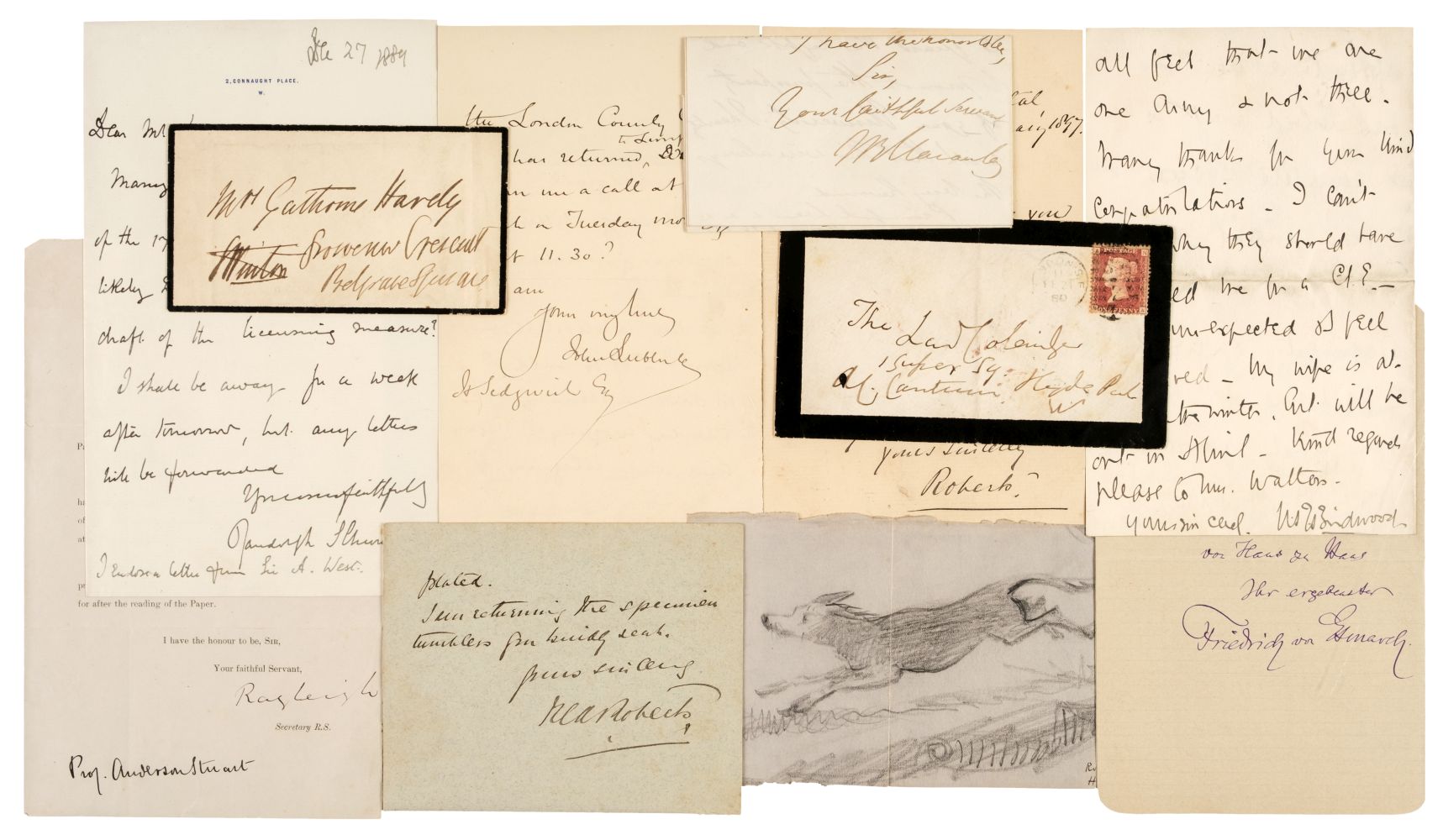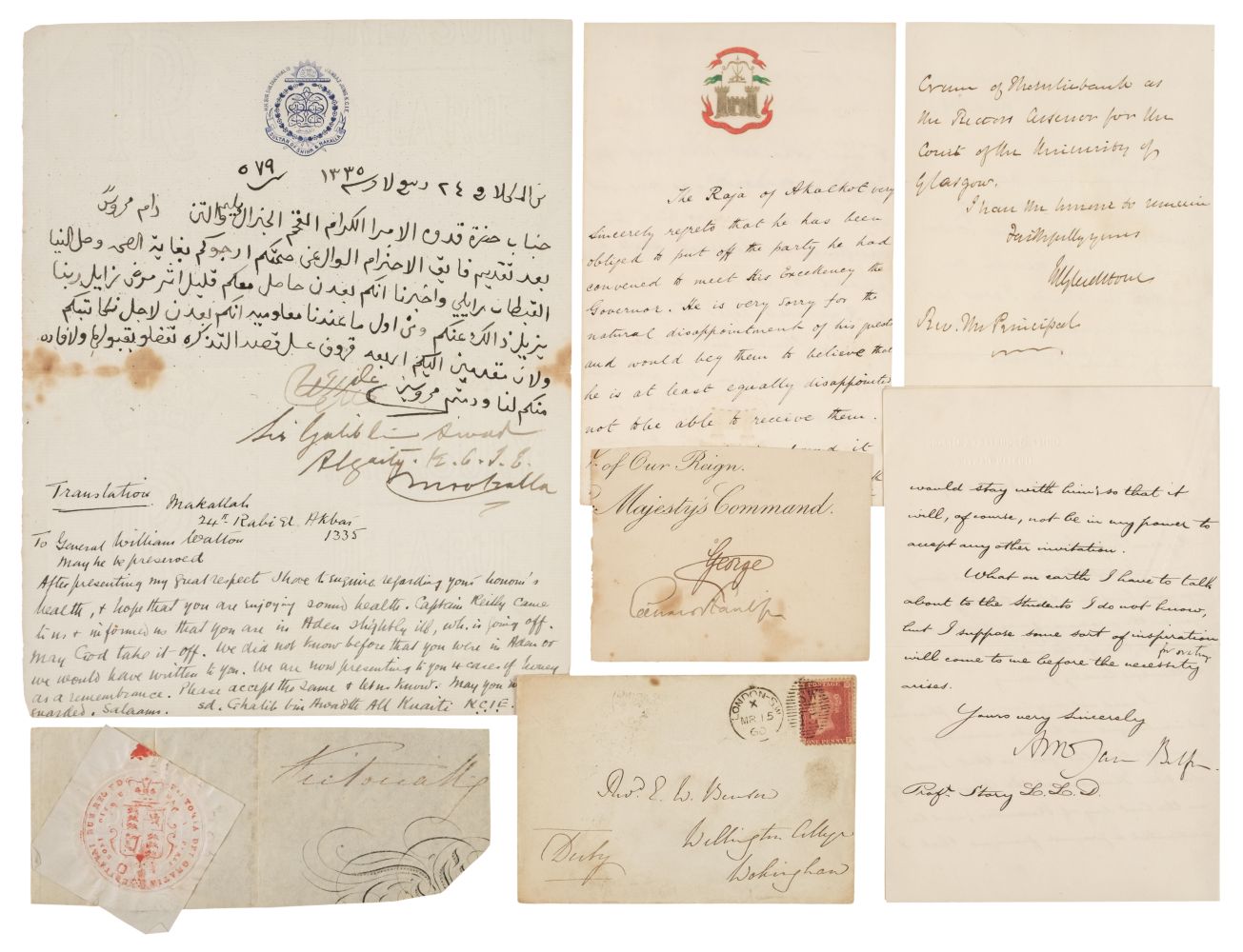• Partially printed DS "A. Curtin." Deed for land in Pennsylvania, vellum, 18.5 x 22 in., 2 June 1865. Signed upper left by Andrew Gregg Curtin (1815 [or 1817] - 1894) as Governor of Pennsylvania (1861-1867). Born to a well-to-do Irish-born manufacturer, Curtin first entered politics in the 1840 election, supporting William Henry Harrison. With the Whig collapse, he joined the new Republican Party, running for Governor in 1860. As a supporter of Lincoln during the Civil War, Curtin was active in organizing and training the state militia. He also became a close friend of Lincoln, visiting the White House to confer on the war effort. He was instrumental in establishing the National Cemetery at Gettysburg after that battle. He also worked to coordinate Union war efforts and governors, and founded support services for wounded soldiers and the families of those who died for the Union cause. He declined a diplomatic position offered by Lincoln, preferring to stay active in war efforts, but after the conflict he accepted President Ulysses Grant's appointment as Ambassador to Russia. He switched to the Democratic party, serving Pennsylvania in the US Congress from 1881-1887. • ALS, 2pp, on Department of the Interior letterhead, Washington (DC), 30 March 1872. Signed "C. Delano" as Secretary of the Interior. To George Edmunds, Chairman of the Commission on Pensions, US Senate. With manuscript "Pensions" written in upper right corner. Delano notes that Congress passed an act in 1856 "admitting parol evidence to establish claims for bounty land warrants, where no record evidence is found to exist." However, apparently this issue arose so frequently that Delano is recommending that Congress give it some special attention. Columbus Delano (1809 - 1896) was born in Vermont to a family that emigrated to North America on the Fortune, the Mayflower's sister ship. After his father died, the family moved to Knox County, Ohio; Columbus was only about 8 years of age. He worked various jobs while studying law, being admitted to the bar in 1831. He became active in politics shortly thereafter, and was elected prosecuting attorney for the county in 1834. A decade later, Delano was elected to the US House of Representatives as a Whig. In the 29th Congress he served on the Committee on Invalid Pensions in the House, so he had some experience with this issue before his later involvement as Secretary of the Interior. As the Whigs fell apart, Delano, like many others, joined the new Republican Party, and supported Lincoln's nomination and campaign in 1860. During the war, he served in the Ohio legislature, helping to pass legislation supporting the war effort in the state. He returned to Congress in 1864, and supported radical reconstruction after the end of the war, believing only a strong Federal presence could keep the peace in a chaotic post-war South. However, he felt that only Congress could establish this presence, not the President, at the time, Andrew Johnson. Later, President Ulysses S. Grant appointed Delano (a distant cousin) as Secretary of the Interior after the resignation of Jacob Cox At the time, Interior was the largest department, with many dissimilar areas of interest. Delano was able to manage these sub-departments effectively and served longer than any other 19th century head of the Interior Department. One of the roles of Interior was managing the Native American populations, although we might not agree with some of his decisions today. He was attempting to protect the people and buffer them from land-hungry speculators. Delano established many policies for dealing with native peoples that continued for many decades after he left office. Delano also organized the first federally funded expedition into Yellowstone, headed by Ferdinand Hayden. Delano ran into a bit of conflict with Grant in 1872 when the President tried to reform the Civil Service system. He was later involved in opposing and prosecuting the Ku Klux Klan, ultimately
• Partially printed DS "A. Curtin." Deed for land in Pennsylvania, vellum, 18.5 x 22 in., 2 June 1865. Signed upper left by Andrew Gregg Curtin (1815 [or 1817] - 1894) as Governor of Pennsylvania (1861-1867). Born to a well-to-do Irish-born manufacturer, Curtin first entered politics in the 1840 election, supporting William Henry Harrison. With the Whig collapse, he joined the new Republican Party, running for Governor in 1860. As a supporter of Lincoln during the Civil War, Curtin was active in organizing and training the state militia. He also became a close friend of Lincoln, visiting the White House to confer on the war effort. He was instrumental in establishing the National Cemetery at Gettysburg after that battle. He also worked to coordinate Union war efforts and governors, and founded support services for wounded soldiers and the families of those who died for the Union cause. He declined a diplomatic position offered by Lincoln, preferring to stay active in war efforts, but after the conflict he accepted President Ulysses Grant's appointment as Ambassador to Russia. He switched to the Democratic party, serving Pennsylvania in the US Congress from 1881-1887. • ALS, 2pp, on Department of the Interior letterhead, Washington (DC), 30 March 1872. Signed "C. Delano" as Secretary of the Interior. To George Edmunds, Chairman of the Commission on Pensions, US Senate. With manuscript "Pensions" written in upper right corner. Delano notes that Congress passed an act in 1856 "admitting parol evidence to establish claims for bounty land warrants, where no record evidence is found to exist." However, apparently this issue arose so frequently that Delano is recommending that Congress give it some special attention. Columbus Delano (1809 - 1896) was born in Vermont to a family that emigrated to North America on the Fortune, the Mayflower's sister ship. After his father died, the family moved to Knox County, Ohio; Columbus was only about 8 years of age. He worked various jobs while studying law, being admitted to the bar in 1831. He became active in politics shortly thereafter, and was elected prosecuting attorney for the county in 1834. A decade later, Delano was elected to the US House of Representatives as a Whig. In the 29th Congress he served on the Committee on Invalid Pensions in the House, so he had some experience with this issue before his later involvement as Secretary of the Interior. As the Whigs fell apart, Delano, like many others, joined the new Republican Party, and supported Lincoln's nomination and campaign in 1860. During the war, he served in the Ohio legislature, helping to pass legislation supporting the war effort in the state. He returned to Congress in 1864, and supported radical reconstruction after the end of the war, believing only a strong Federal presence could keep the peace in a chaotic post-war South. However, he felt that only Congress could establish this presence, not the President, at the time, Andrew Johnson. Later, President Ulysses S. Grant appointed Delano (a distant cousin) as Secretary of the Interior after the resignation of Jacob Cox At the time, Interior was the largest department, with many dissimilar areas of interest. Delano was able to manage these sub-departments effectively and served longer than any other 19th century head of the Interior Department. One of the roles of Interior was managing the Native American populations, although we might not agree with some of his decisions today. He was attempting to protect the people and buffer them from land-hungry speculators. Delano established many policies for dealing with native peoples that continued for many decades after he left office. Delano also organized the first federally funded expedition into Yellowstone, headed by Ferdinand Hayden. Delano ran into a bit of conflict with Grant in 1872 when the President tried to reform the Civil Service system. He was later involved in opposing and prosecuting the Ku Klux Klan, ultimately















Try LotSearch and its premium features for 7 days - without any costs!
Be notified automatically about new items in upcoming auctions.
Create an alert